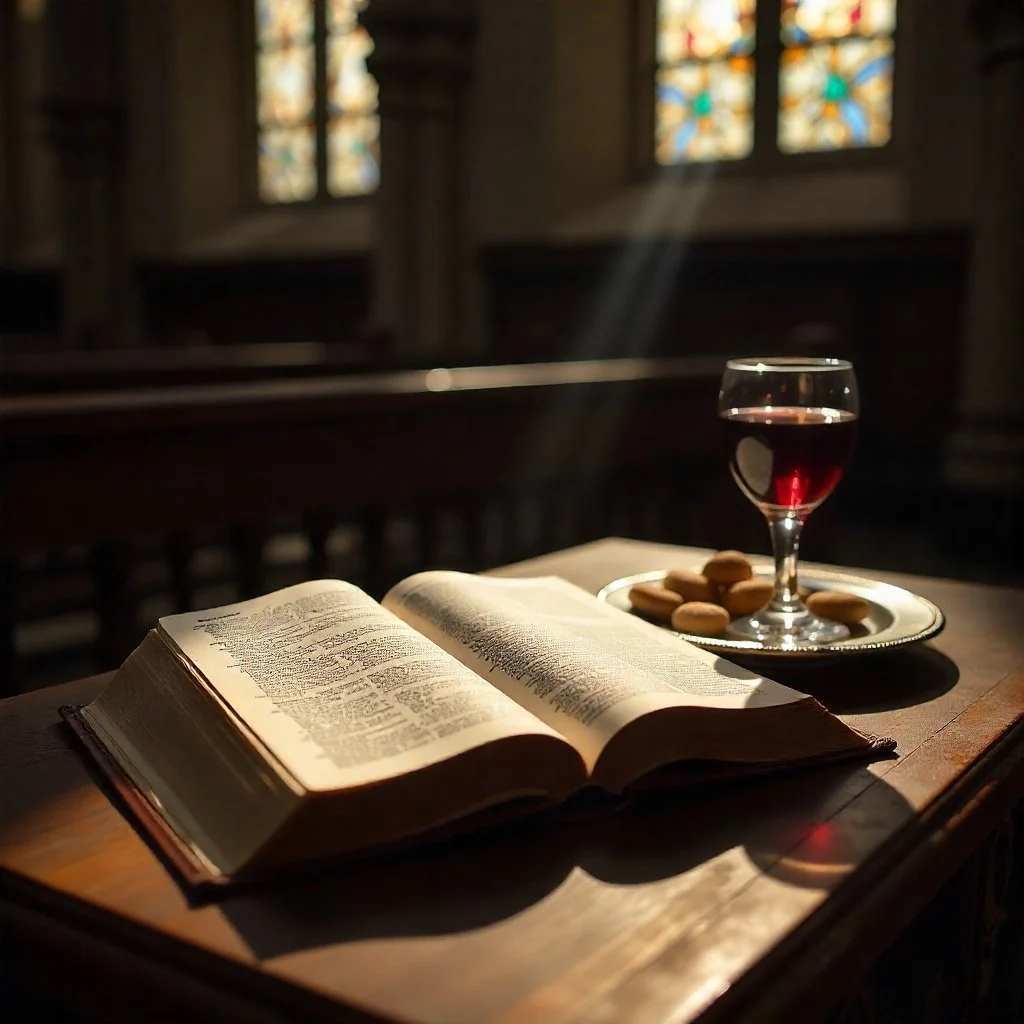Experiencing God’s Wisdom Through Word and Sacrament
You cannot be a Presbyterian for very long without hearing that our “Book of Order” is boring. I refuse to lie; there are several boring aspects of the document. While beneficial, the “governance” section about how our government functions is not an edge-of-your-seat read. Don’t get me started on its Book of Discipline. Yet, its Worship section has several beautifully meaningful descriptions that help us appreciate the theology behind our worshipful actions.
One example is W-1.0106 Word and Sacrament. “In Christian worship Jesus Christ is truly present and active among us, by the power of the Holy Spirit, through the gifts of Word and Sacrament. Wherever the Scriptures are read and proclaimed and the Sacraments of Baptism and the Lord’s Supper are celebrated, the Church bears witness to Jesus Christ, the living Word, and proclaims the mystery of faith. Through these means of grace, God imparts and sustains our faith, orders our common life, and transforms the world. Through these same acts of worship, we share in the life of the Spirit, are united to Jesus Christ, and give glory to God.”
For Presbyterians and several other Christian groups, the act of worship is to be present with Jesus the Christ. The way worship guides us to the presence of the Son of God is through Word and Sacrament. Let’s begin with the “Word.” Word is capitalized because the Word is God’s expression and is unique from anyone else’s communication. Word is complex, because it also signifies the organized words and “books” of Scripture. The Scriptures comprise the Hebrew Bible, also known as the Old Testament, and the Christian New Testament. The Roman Catholic Scriptures include more “books” than the Protestant Bible. Throughout Christian history, there continues to be disagreement over what Christian institutions include in sacred Scripture.
For Presbyterians, each word in the Bible is not literally God’s voice. Instead, the words are written by human writers, sharing stories, laws, hymns, parables, and other literary forms to express divine action and instruction in the past. Through the Holy Spirit, the Word is inspired and gives us the capability to inspire. Reading the Word allows us to recognize how God related to the faithful in the past and helps us visualize how God wants us to respond in the present and into the future.
Next, the Word is effective only when the faithful read it and use it in private devotion and worship. Christian worship requires both the reading of the Word and its proclamation. Those who claim to have worshiped without reading and proclaiming the Word have not worshiped. Proclamation requires prayer for illumination of Scripture, as well as an educational understanding of its history, literary content, and other facets, to grasp the nuances of what the original writers intended us to understand. The other task of the preacher, relying on the Holy Spirit, is to take the Scripture and to relate it faithfully to our present life situation. The Scriptures, although written in ancient times, continue to speak to each generation.
The next aspect of Christian worship is the gift of the sacraments. Protestants have two sacraments: Baptism and the Lord’s Supper (Holy Communion). Both Sacraments are instituted in the act of worship. I’ve only performed two baptisms outside of public worship, and both had extenuating issues, like a dying grandparent in the hospital. Still, even then, we had congregational representatives to act as a form of worship. Baptism is a covenant relationship between God and the one at the font. In baptism, God agrees to sign a legally binding document, binding the person to God for the rest of their life and life eternal. God binds the person by the agreement to dedicate their life to God, and God commits to be with the person throughout their life, through death, and into the resurrection. We should be humbled by our omnipotent God’s willingness to bind God’s self to us legally and indefinitely.
The gift of Holy Communion was instituted on the night Jesus prepared the Apostles for his death and resurrection, during the Last Supper. In communion, Jesus also prepares us for the challenges ahead. Communion provides an intimacy with our Lord, offering the inner strength and healing necessary to face the world’s pain with hope and trust. We receive communion together, in community, because it shows that we are all in need of God’s support, love, and strength in our journey with God.
Scripture and the Sacraments proclaim the “living Word.” What makes the Word living is expressed in the inner dialogue between each faithful person and the Holy Spirit. The lifelong engagement between us and the divine One creates a living relationship that transcends death to life eternal.
The following phrase in the “Word and Sacrament” section addresses faith as a mystery. Why do some people accept God into their hearts and minds, while others dismiss God as a human creation to survive in an unjust world where life ends in death without hope for anything beyond decay? We cannot earn our faith or dictate the details of our salvation. The mystery of faith lies in accepting that God is in control and trusting in God's grace for our salvation. Our faith is imparted and sustained not by our initiative, but by God’s loving grace, love, and care.
Word and Sacrament are God’s way of imparting faith and ordering our lives. The sabbath, for example, orders our life because each Sunday frames our week and places God’s loving care in focus. The Spirit steps into our lives because of the covenant relationship and unites us with God. Our task in this world is to give God the glory, and God will guide our way to life eternal.
One little paragraph from the Book of Order, W-1.0106 Word and Sacrament, and you get an idea of the intellect, passion, and divine wisdom that went into every word of the book that guides how we live. The Book of Order does not replace the Bible; rather, it is inspired throughout by the Spirit’s insight. Prayerfully embrace the Word of God in Scripture and the Sacraments God uses to bind you to our Triune God. Word and Sacraments are loving gifts for your eternal enjoyment and comfort.


